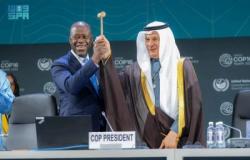(Agence Ecofin) – The sky continues to darken for Uniwax, Ivorian textile leader, which has just published its results for the third quarter of 2024. The figures confirm a continued deterioration in the company’s financial performance, a downward trend that has begun since the covid period.
Uniwax closed its third quarter of 2024 with a turnover of 19.88 billion FCFA ($33 million), down 16.1% compared to the 23.71 billion FCFA recorded during the same period in 2023. This drop follows that of the first half, where revenues had already fallen by 22.7%, a loss of commercial momentum that the company, which faces strong competition from legal and illegal imports of second-hand clothes from Europe and ready-to-wear Chinese wear, which represents around 80% of the overall clothing market in Ivory Coast, is struggling to contain.
Operating results follow this unfavorable trend, with an operating loss of 2.11 billion FCFA for this quarter, further accentuating the losses recorded in the first half. The net result, also negative, now reached 2.17 billion FCFA, compared to a loss of 879 million FCFA in the third quarter of the previous year.
Faced with this deterioration of accounts, Uniwax management puts forward several reasons. She cites a degraded regional situation, with a decline in purchasing power and security difficulties in the sub-region, particularly in Guinea, Burkina Faso and Mali. In addition, access to foreign exchange, crucial for certain customers outside the UEMOA zone, notably Nigeria, is restricted, while the cost of inputs is increasing and counterfeiting is increasing, which directly affects demand. for the brand’s products. These elements, combined, weighed on volumes sold and contributed to the erosion of profit margins.
A negative spiral initiated for several years
If 2024 proves to be particularly challenging, Uniwax’s financial situation has been showing signs of weakness for several years. In 2023, annual turnover had fallen to 29.69 billion FCFA, compared to 36.37 billion FCFA in 2022, a drop of almost 18%. This reduction in sales followed a decline observed in 2022, where revenues had already fallen by 5% compared to the previous year. Uniwax has never again reached its sales of more than 40 billion FCFA in 2019.
The company’s profits follow a similar curve. After rebounding to 1.4 billion FCFA in 2021, the first post-covid financial year, Uniwax’s net profit showed a net loss of 1.30 billion FCFA in 2022, accentuated in particular by purchasing costs and shipping costs. operations, which continue to squeeze margins. In 2023, this net loss increased to 2.04 billion FCFA and marks a deficit for the second consecutive year. This trend continues in 2024, with quarterly losses which are added to a carry forward with serious consequences for the company’s equity. The company’s cost structure, notably purchasing costs and operational expenses, remains high relative to the revenue generated, which is hampering any real recovery in profitability.
This situation occurs in a context of restructuring of the company’s shareholding, since the Vlisco group, to which Uniwax belongs, came under the control of MIA Inc. in 2018, headed by Kodjo Annan, son of the former secretary general of the UN, Kofi Annan. Although this acquisition aimed to revitalize the group’s activities, Uniwax’s performance is slow to show the expected effects.
Strategic adjustments announced
Aware of these challenges, Uniwax’s top management has announced strategic discussions to try to rectify the situation. Among the avenues considered, cost reduction, preservation of the brand against counterfeiting, and a strategic reorientation to return to sustainable growth.
Will these announcements, the outlines of which have yet to be revealed, be enough to raise the bar? The coming months will be decisive for the company which must deal with an uncertain regional situation and weakened competitiveness, in particular by strong competition from imported and counterfeit products, an increase in logistics costs and inputs, in particular dyes and cotton, poorly processed. locally (only 2% of cotton produced in the country is transformed into textiles) and increasingly demanding consumer tastes.
Fiacre E. Kakpo






